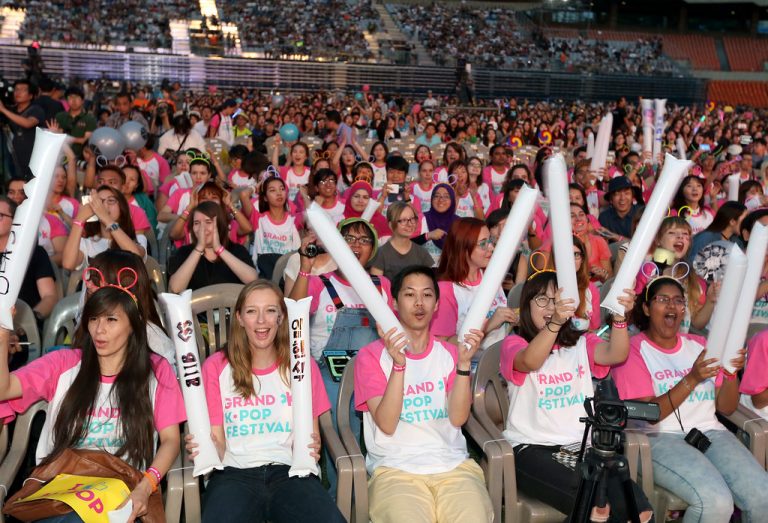Globalization of K-pop: How Common is the Use of Non-Korean Languages?
On August 5, BTS, Snoop Dogg, and Benny Blanco released a new track, “Bad Decisions.” This is not the first time BTS has collaborated with western artists. They have also worked with other big names such as Nicki Minaj, Halsey, Lauv, Megan Thee Stallion, and Coldplay in the past several years. As K-pop has become more global, it is becoming increasingly common for groups to collaborate with artists from all over the world and sing in non-Korean languages.
Japanese and Chinese Markets
Although K-pop started in the 1990s, there were no Japanese lyrics or songs initially. Before 1998, South Korea banned Japanese pop culture due to conflicts between the two countries. It was not until 2000 that South Korea lifted the ban on Japanese music.
K-pop soloist BoA was the first Korean act to break into the Japanese music market, the second biggest only to the United States. Her Japanese debut in 2001 earned her the top spot on Japanese charts, making her the first Korean to do so. BoA’s success in Japan was the beginning of the Korean wave internationally, for which she has since been recognized as a pioneer in the K-pop industry.
Many K-pop acts now release Japanese content. Some release albums with Japanese versions of their Korean songs with a few original songs in Japanese, such as BTS’ FACE YOURSELF album. Others release all original Japanese albums, such as TWICE’s Perfect World and THE BOYZ’s Breaking Dawn.
The use of Chinese is more rare in K-pop. China has the second largest export of K-pop (23.6%) to Japan, but it is less common for idols to learn Chinese like they do Japanese, and even rarer for them to have Chinese original albums. It was more common for K-pop acts to release Chinese versions of their songs several years ago than it is now.
Groups with several Chinese members, such as NCT, EXO, and SEVENTEEN, are more likely to have Chinese versions of their songs. While groups without any Japanese members often release Japanese songs, groups with no Chinese members rarely release Chinese versions of songs.
Prevalence of English
K-pop has included English lyrics for a long time, although primarily sprinkled in words or short phrases. Since K-pop has become more global in recent years, it is more common for groups to release songs in English, the most spoken language worldwide.
Just as groups release Japanese versions of songs originally in Korean, there are also many English versions. ITZY, for example, has Japanese and English versions of all their originally-Korean title tracks.
In 2020, Monsta X released All About Luv, an album with only original English songs. The first full-English album by a K-pop act in more than a decade, the album earned them the fifth spot on the Billboard 200 albums chart. Since then, lots of groups have released their first original English songs, some of the most notable being BTS’ “Dynamite,” TWICE’s “The Feels,” TXT’s “Magic,” and SEVENTEEN’s “Darling.” BLACKPINK also had many all-English tracks on their most recent album, The Album. In 2021, Monsta X released another full English album, The Dreaming.
K-pop and Western Artists
As K-pop music has become more recognized worldwide, many K-pop acts are collaborating with western artists. BLACKPINK has songs with Dua Lipa, Cardi B, Selena Gomez, and Lady Gaga. French Montana and Pitbull have both been featured on Monsta X songs. Alesso released a song with Stray Kids, and EDM duo Grey has one with A.C.E.
While these collabs are often entirely in English, they are sometimes multilingual. In their 2019 song “Chicken Noodle Soup,” J-Hope of BTS and Becky G each sang in their native languages of Korean and Spanish, respectively. Chungha’s song “Demente,” with Puerto Rican artist Guaynaa, also included Korean and Spanish. K-pop soloist AleXa’s “Is It On” with Kuwaiti-Saudi artist Bader AlShuaibi is in English and Arabic.
K-pop artists often cover western artists’ songs and sometimes add their own color by including Korean lyrics. P1Harmony, Hongjoong of ATEEZ, and Sunwoo of THE BOYZ have all done this in their covers of Olivia Rodrigo’s “good 4 u,” Linkin Park’s “Numb,” and Rich Brian’s “100 Degrees,” respectively.
As K-pop continues to globalize, so will the music. More songs, collaborations, and covers are bridging different cultures and languages, allowing more people worldwide to connect through K-pop.



